- Home
- John Irving
Last Night in Twisted River Page 7
Last Night in Twisted River Read online
Page 7
"Is it their breasts that men like about women?" Danny had asked his father.
"Ask Ketchum," the cook had replied, but Danny thought that Ketchum was too old to take an interest in breasts--Ketchum seemed too old to even notice breasts anymore. Granted, Ketchum had lived hard; he'd been roughed up and looked older than he was. Ketchum was only thirty-seven--he just looked a lot older (except for how black his hair and beard were).
And Jane--how old was she? Danny wondered. Injun Jane was twelve years older than Danny's dad--she was forty-two--but she looked older, too. She'd been roughed up as well, and not only by Constable Carl. To the twelve-year-old, everyone seemed old--or older than they were. Even the boys in Danny's grade at school were older.
"I'll bet you had a great night's sleep," Jane was saying to the cook. She smiled at Danny. When she reached behind herself to tie the apron strings around her thick waist, her breasts were gigantic! the boy was thinking. "Did you get any sleep, Danny?" the Indian dishwasher asked him.
"Sure, I got enough," the boy answered. He wished his dad and the sawmill workers' wives weren't there, because he wanted to ask Jane about his mother.
His dad could talk to him about Ketchum retrieving her battered body from the spillway; maybe that was because Ketchum had prevented the cook from seeing what the river and the logs had done to her. But Danny's father could never talk about the accident itself--at least not to his son, and not with anything approximating specific details. Ketchum could barely bring himself to say more. "We were all drunk, Danny," Ketchum always began. "Your dad was drunk, I was drunk--your mom was a little drunk, too."
"I was the drunkest," Dominic would assert, without fail. There was such blame attached to his drunkenness that the cook had stopped drinking, though not immediately.
"Maybe I was drunker than you, Cookie," Ketchum sometimes said. "After all, I let her go out on the ice."
"That was my fault," the cook usually insisted. "I was so drunk that you had to carry me, Ketchum."
"Don't think I don't remember," Ketchum would say. But neither man could (or would) say exactly what had happened. Danny doubted that the details had eluded them; it was more a matter of the details being unutterable, or that it was unthinkable for either man to divulge such details to a child.
Injun Jane, who had not been drinking--she never drank--told the twelve-year-old the story. As many times as the boy had asked her, she'd told him the same story every time; that's how he knew it was probably true.
JANE HAD BEEN DANNY'S babysitter that night; Danny would have been two. On a Saturday night, there was dancing in the dance hall--there was both actual dancing and square dancing then. Dominic Baciagalupo didn't dance; with a limp like his, he couldn't. But his somewhat older wife--Ketchum called her "Cousin Rosie"--loved to dance, and the cook loved to watch her dance, too. Rosie was pretty and small, both thin and delicate--in a way that most of the women her age in Twisted River and Paris, New Hampshire, were not. ("Your mom didn't have the body of someone pushing thirty--not someone from around here, anyway," as Injun Jane put it, whenever she told the story to young Dan.)
Apparently, Ketchum was either too old or already too banged-up for the war. Although Constable Carl had fairly recently split open Ketchum's forehead, Ketchum had already had a host of other injuries and maimings--enough to make him ineligible for military service, but not of sufficient severity to stop him from dancing. "Your mother taught Ketchum to read and dance," the cook had told his son--in a curiously neutral-sounding way, as if Dominic either had no opinion or didn't know which of these acquired skills was the more remarkable or important for Ketchum to have learned. In fact, Ketchum was Rosie Baciagalupo's only dance partner; he looked after her as if she were his daughter, and (out on the dance floor) the cook's wife was so small beside Ketchum that she almost could have passed for his child.
Except for the "noteworthy coincidence," as Danny had heard Injun Jane say, that the boy's mom and Ketchum were both twenty-seven years old.
"Ketchum and your dad liked to drink together," Jane told young Dan. "I don't know what it is that men like about drinking together, but Ketchum and your dad liked it a little too much."
Perhaps the drinking had allowed them to say things to each other, Danny thought. Since Dominic Baciagalupo had become a teetotaler--though Ketchum still drank like a riverman in his early twenties--maybe the men had more guarded conversations; even the twelve-year-old knew there was a lot they left unsaid.
According to Ketchum, "Injuns" couldn't or shouldn't drink at all--he took it as simple common sense that Injun Jane didn't drink. Yet she lived with Constable Carl, who was a mean drunk. After the dance hall and the hostelry bars had closed, the constable drank himself into a belligerent temper. It was often late when Jane drove herself home--when she'd finished with washing the towels and had put them in the dryers in the laundry room, and could only then drive home from the cookhouse. Late or not, Constable Carl was occasionally awake and warlike when Jane was ready to go to bed. After all, she got up early and the cowboy didn't.
"I'll draw you a picture," Injun Jane would say to young Dan, sometimes apropos of nothing. "Your father couldn't drink as much as Ketchum, but he would try to keep up. Your mother was more sensible, but she drank too much, too."
"My dad can't drink as much as Ketchum because he's smaller?" Danny always asked Jane.
"Weight has something to do with it, yes," the dishwasher generally replied. "It wasn't the first night that Ketchum carried your dad back to the cookhouse from the dance hall. Your mom was still dancing around them, doing her pretty little do-si-dos." (Did young Dan ever detect a degree of envy or sarcasm in the way Injun Jane referred to Cousin Rosie's pretty little do-si-dos?)
Danny knew that a do-si-do was a square-dance figure; he'd asked Ketchum to show him, but Ketchum had shaken his head and burst into tears. Jane had demonstrated a do-si-do for Danny; with her arms folded on her enormous bosom, she passed by his right shoulder, circling him back-to-back.
The boy tried to imagine his mother do-si-doing Ketchum as the big man carried his dad. "Was Ketchum dancing, too?" Danny asked.
"I suppose so," Jane replied. "I wasn't with them until later. I was with you, remember?"
At the frozen river basin, Rosie Baciagalupo stopped do-si-doing Ketchum and called across the ice to the mountainside. When Twisted River was frozen, there was more of an echo; the ice brought your voice back to you quicker and truer than if it had traveled over the open water.
"I wonder why that is," Danny usually said to Jane.
"I heard them from the cookhouse," Injun Jane went on, never offering any speculation on the echo. "Your mom called, 'I love you!' Your dad, over Ketchum's shoulder, called back, 'I love you, too!' Ketchum just yelled, 'Shit!' and other such things; then he yelled, 'Assholes!' Pretty soon all three of them were yelling, 'Assholes!' I thought the yelling would wake you up, although nothing woke you up at night--not even when you were two."
"My mom went out on the ice first?" Danny always asked.
"Do-si-dos on the ice were hard to do," Jane answered. "Ketchum went out on the ice to do-si-do with her; he was still carrying your dad. It was black ice. There was snow in the woods, but not on the river basin. The basin was windblown, and there'd been no new snow for almost a week." Jane usually added: "Most years, the ice didn't break up in the river basin this way."
The drunken cook couldn't stand, but he wanted to slide around on the ice, too; he made Ketchum put him down. Then Dominic fell down--he just sat down on the seat of his pants, and Ketchum pushed him like a human sled. Danny's mom do-si-doed the two of them. If they hadn't been yelling, "Assholes!" so loudly, one of them might have heard the logs.
In those days, the horse-loggers dumped as many logs as they could on the river ice between Little Dummer Pond and the basin in Twisted River--and on the tributary streams upriver, too. Sometimes, the weight of the logs broke through the ice on Dummer Pond first; it was the bigger of the Dumme
r ponds, held back by a sluice dam that didn't always hold. One way or another, the ice upstream of the town of Twisted River always broke up first, and in the late winter of 1944, the logs shot down the rapids from Little Dummer Pond, the ice breaking ahead of the logs--both the broken slabs of ice and all the logs coming into the river basin in an unimpeded torrent.
In the late winter or early spring, this invariably happened; it just usually happened in the daytime, because the daytime weather was warmer. In 1944, the avalanche of logs came into the river basin at night. Ketchum was pushing Dominic across the ice on the seat of his pants; the cook's pretty, "somewhat older" wife was dancing around them.
Was the phrase "somewhat older" a part of Injun Jane's account of that night? (Danny Baciagalupo wouldn't remember, although he knew for a fact that Jane never failed to interject--at the moment the logs rushed into the river basin--the aforementioned "noteworthy coincidence" that Ketchum and Cousin Rosie were the same age.)
Injun Jane had opened the door from the cookhouse kitchen; she was going to tell them to stop yelling, "Assholes!" or they would wake up little Danny. Jane was high enough above the river basin to hear the rushing water and the logs. All winter long, the sound of the river was muffled under the ice and snow. Not that Saturday night. Jane closed the kitchen door and ran down the hill.
No one was yelling, "Assholes!" now. The first of the logs skidded onto the ice in the river basin; the logs were wet, and they seemed to pick up speed when they hit the ice. Some of the logs were driven deep into the basin, under the ice; when they rose, the bigger logs broke through the ice from underwater. "Like torpedoes," Injun Jane always said.
By the time Jane reached the river basin, the sheer weight of the logs was breaking up the ice; when the ice first broke, some of the slabs were as big as cars. Ketchum had left the cook in a sitting position when he first saw Rosie disappear. One second, she was do-si-doing; in the next second, she had slipped out of sight behind a slab of ice the size of a wall. Then the logs completely covered where she'd been. Ketchum picked his way back across the chunks of ice and bobbing logs to where the cook had fallen on one side. Dominic Baciagalupo was drifting downstream on a pulpit-size slab of ice.
"She's gone, Cookie--gone!" Ketchum was calling. The cook sat up, surprised to see a log rise out of the basin and come crashing down beside him.
"Rosie?" Dominic asked. If he had yelled, "I love you, too," there would have been no discernible echo now--not with the noisy music the logs and broken ice were making. Ketchum put the cook over his shoulder and tiptoed from log to log ashore; sometimes he stepped on an ice floe instead of a log, and his sinking leg would get wet above his knee.
"Assholes!" Injun Jane was yelling from the riverbank--to both of them, or all three of them. "Assholes! Assholes!" she cried and cried.
The cook was wet and cold and shivering, and his teeth were chattering, but Ketchum and Jane could understand him well enough. "She can't be gone, Ketchum--she can't just disappear like that!"
"But she was gone that fast, Danny," the dishwasher told the boy. "Faster than the moon can slide behind a cloud--your mom was gone like that. And when we got back to the cookhouse, you were wide awake and screaming--it was worse than any nightmare I ever saw you have. I took it as a sign that you somehow knew your mom was gone. I couldn't get you to stop crying--you or your father. Ketchum had got hold of a cleaver. He just stood in the kitchen with his left hand on a cutting board, holding the cleaver in his right hand. 'Don't,' I told him, but he kept staring at his left hand on the cutting board--imagining it gone, I guess. I left him in order to look after you and your dad. When I came back to the kitchen, Ketchum was gone. I looked everywhere for his left hand; I was sure I was going to find his hand somewhere. I didn't want you or your father finding it."
"But he didn't cut his hand off?" Danny always interrupted her.
"Well, no--he didn't," Jane told the boy, with some impatience. "You've noticed that Ketchum still has a left hand, haven't you?"
Sometimes, especially when Ketchum was drunk, Danny had seen the way the logger looked at his left hand; it was the way he'd stared at his cast last night. If Injun Jane had seen Ketchum staring at his cast, she might have taken this as a sign that Ketchum still thought about cutting off his hand. (But why the left one? Danny Baciagalupo would wonder. Ketchum was right-handed. If you hated yourself, if you were really taking yourself to task or holding yourself accountable, wouldn't you want to cut off your good hand?)
THEY WERE BUSTLING about the kitchen--all the fat women, and the lean cook with his leaner son. You didn't pass behind someone without saying, "Behind you!" or putting your hand on the person's back. When the sawmill workers' wives passed behind Danny, they often patted the boy on his bum. One or two of them would pat the cook on his bum, too, but not if Injun Jane was watching. Danny had noticed how Jane often placed herself between his father and the kitchen helpers--especially in the narrow gauntlet between the stove and the countertop, which got narrower whenever the oven doors needed to be opened. There were other tight quarters in the cookhouse kitchen, challenging the cooks and the servers, but that passage between the stove and the countertop was the tightest.
Ketchum had gone outside to pee--a seemingly unbreakable habit from the wanigan days--while Injun Jane went into the dining room to set the tables. In those "good old days" in the portable logging camps, Ketchum liked to wake up the rivermen and the other loggers by pissing on the metal siding of the sleeping wanigans. "There's a wanigan in the river!" he was fond of hollering. "Oh, sweet Jesus--it's floating away!" A cacophony of swearing followed, from inside the portables.
Ketchum also liked to beat on the metal siding of the sleeping wanigans with one of the river drivers' pike poles. "Don't let the bear in!" he would holler. "Oh, Lord--it's got one of the women! Oh, Lord--dear God, no!"
Danny was ladling the warm maple syrup from the big saucepan on the back burner into the pitchers. One of the sawmill workers' wives was breathing down the back of the boy's neck. "Behind you, cutie!" the woman said hoarsely. His dad was dipping the banana bread in the egg mixture; one of the kitchen helpers was putting the banana-bread French toast on the griddle, while another kept turning the lamb hash with a spatula.
Before he went outside for an apparently never-ending piss, Ketchum had spoken to the twelve-year-old. "Nine o'clock, Sunday morning--don't let your dad forget, Danny."
"We'll be there," the boy had said.
"What plans are you making with Ketchum?" Injun Jane whispered in the twelve-year-old's ear. Big as she was, the boy hadn't noticed her behind him; he first mistook her for the sawmill worker's wife who'd been breathing down his neck, but Jane had returned from the dining room.
"Dad and I are meeting Ketchum at Dead Woman Dam on Sunday morning," Danny told her.
Jane shook her head, her long braid, longer than a horse's tail, swishing above her big rump. "So Ketchum talked him into it," she said disapprovingly; the boy couldn't see her eyes above the pulled-down visor of her Cleveland Indians cap. As always, Chief Wahoo was grinning insanely at the twelve-year-old.
The near-perfect choreography in the kitchen would have been imperceptible to a stranger, but Danny and the Indian dishwasher were used to it. They saw that everything was always the same, right down to the cook holding the hot tray of scones with the oven mitts while the sawmill workers' wives deftly got out of his way--one of them knocking the corn muffins out of the muffin tins into a big china bowl as she did so. No one bumped into anyone, big as they all were--save Danny and his dad, who were (in the present company) noticeably small.
In the cramped aisle between the countertop and the stove, where there was a pan or a pot on six of the eight burners, the cook and the Indian dishwasher passed back-to-back. This wasn't new--it happened all the time--but Danny caught a nuance in their dance, and he overheard (as he previously hadn't) the brief but distinct dialogue between them. As they passed, back-to-back, Jane deliberately bumped Domin
ic--she just touched her big rump to the middle of his back, because the top of the cook's head came up only to Jane's shoulders.
"Do-si-do your partner," the dishwasher said.
Despite his limp, the cook caught his balance; not one scone slid off the hot tray. "Do-si-do," Dominic Baciagalupo softly said. Injun Jane had already passed behind him. No one but Danny had noticed the contact, though if Ketchum had been there--drunk or sober--Ketchum surely would have noticed. (But Ketchum, of course, was outside--presumably, still pissing.)
CHAPTER 3
A WORLD OF ACCIDENTS
ANGEL POPE HAD GONE UNDER THE LOGS ON THURSDAY. After breakfast on Friday, Injun Jane drove Danny in her truck to the Paris Manufacturing Company School, on Phillips Brook, and then drove back to the cookhouse in Twisted River.
The river-driving crew would be prodding logs on a site just upstream of Dead Woman Dam. The cook and his kitchen helpers would prepare four midday meals; they would backpack two meals to the rivermen, and drive two meals to the loggers loading the trucks along the haul road between the town of Twisted River and the Pontook Reservoir.
Fridays were hard enough without the woe of losing Angel. Everyone was in too much of a hurry for the weekend to start, although weekends in Twisted River (in the cook's opinion) amounted to little more than drinking too much and the usual sexual missteps--"not to mention the subsequent embarrassment or shame," as Danny Baciagalupo had heard his dad say (repeatedly). And from Dominic's point of view, the Friday-night meal in the cookhouse was the week's most demanding. For the practicing Catholics among the French Canadians, the cook made his renowned meatless pizzas, but for the "non-mackerel-snappers"--as Ketchum was fond of describing himself, and most of the loggers and sawmill workers--a meatless pizza on a Friday night wouldn't suffice.

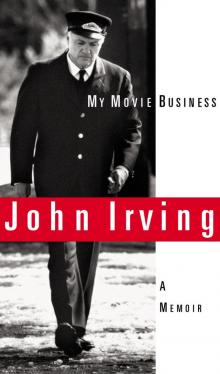 My Movie Business: A Memoir
My Movie Business: A Memoir In One Person
In One Person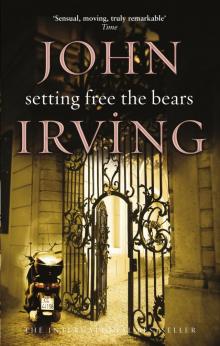 Setting Free the Bears
Setting Free the Bears The Fourth Hand
The Fourth Hand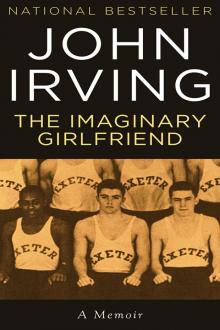 The Imaginary Girlfriend
The Imaginary Girlfriend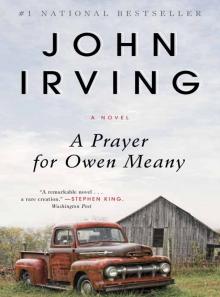 A Prayer for Owen Meany
A Prayer for Owen Meany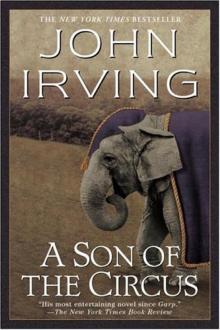 A Son of the Circus
A Son of the Circus Last Night in Twisted River
Last Night in Twisted River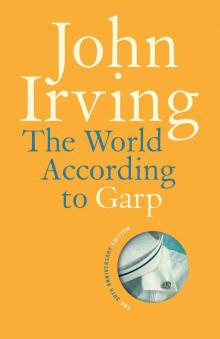 The World According to Garp
The World According to Garp The Cider House Rules
The Cider House Rules The Hotel New Hampshire
The Hotel New Hampshire The 158-Pound Marriage
The 158-Pound Marriage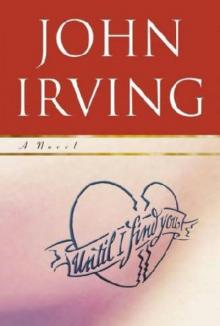 Until I Find You
Until I Find You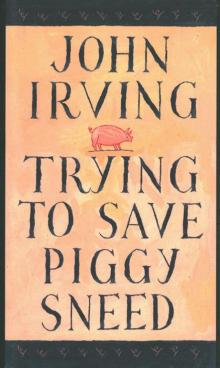 Trying to Save Piggy Sneed
Trying to Save Piggy Sneed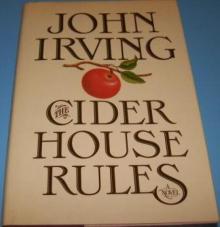 Cider House Rules
Cider House Rules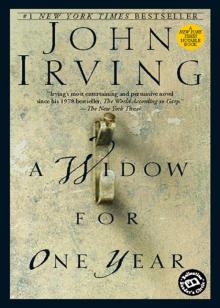 A Widow for One Year
A Widow for One Year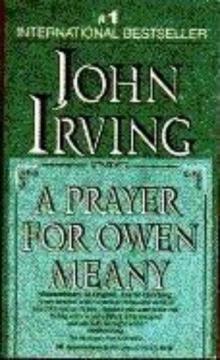 A prayer for Owen Meany: a novel
A prayer for Owen Meany: a novel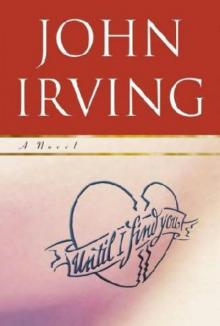 (2005) Until I Find You
(2005) Until I Find You